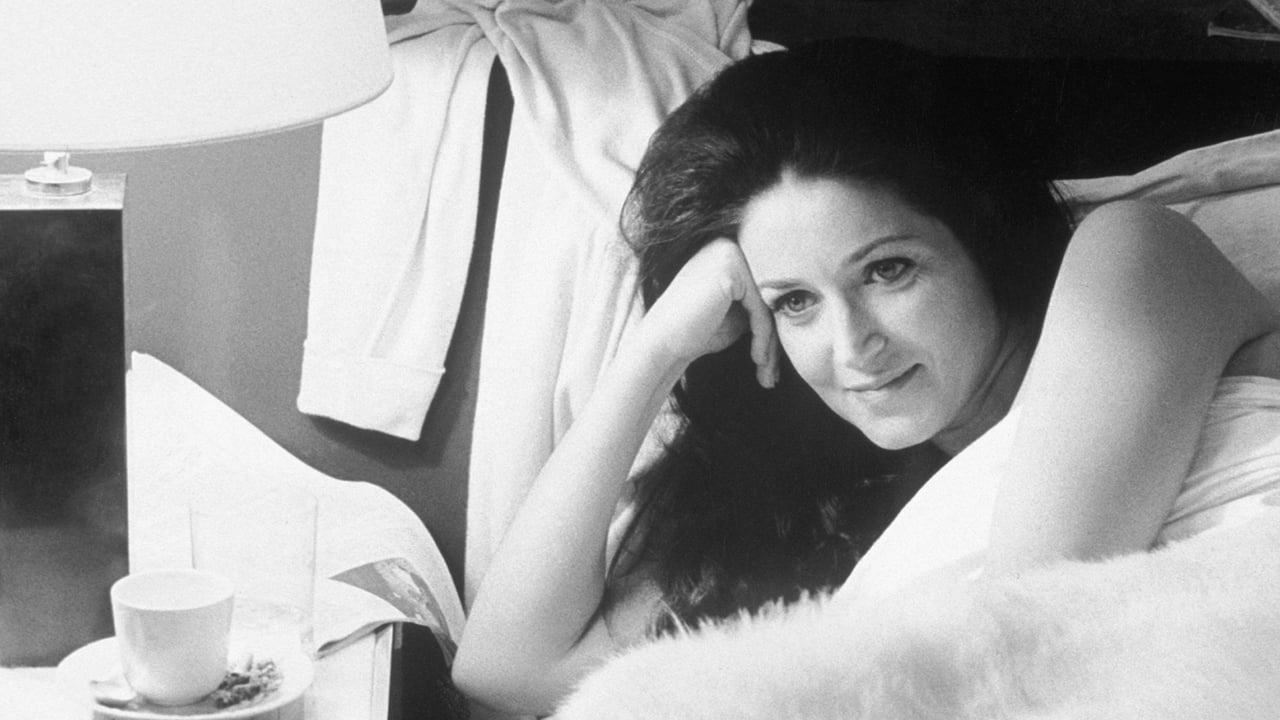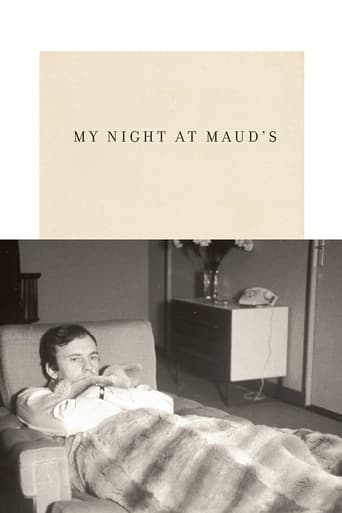

Let's be realistic.
... View MoreGood idea lost in the noise
... View Moregood back-story, and good acting
... View MoreEach character in this movie — down to the smallest one — is an individual rather than a type, prone to spontaneous changes of mood and sometimes amusing outbursts of pettiness or ill humor.
... View MoreAs the young protagonist, a Catholic with a precise set of morals, jousts with his friend about Pascal and his belief that we must embrace religion because it's the safest course, we see what I would call a failure to meet life head on. I never found this guy an attractive character because he was so caught up in his righteousness. When he meets Maude, who could have been a wonderful addition to his life, he is so full of "morality" that he passes her by. One can be dead without the physical act of dying. Apparently, the women he encountered in the past grew tired of his sense of perfection. Maude does everything to entice him and he ends up in an embrace that he rejects. At that moment his very sterility is exposed. He has the hots for a pretty young woman who goes to his church, Francoise, whom he pretty much stalks. She is right for him. She is pretty but also quite dull. Rohmer shows us he one can win in some respects but ultimately lose.
... View MoreThe trendy statues being unmovable in the ordinary I add nothing not to go into the fawning, but for this movie which is one of better of Rohmer I allow myself a precision: as usual the director offers us stereotypes and the being fact that they are so much calcified, that they take an inverse shape during the movie. Whatever it pleases or not to these fanatics of the author of the legendary author from the french "Nouvelle-Vague".To begin with the central figure, Jean-Louis, the Catholic who does not know what he wants (as all the Catholics, moreover and I know what I'm talking about.) Thus, if we cross by the bourgeois à-priori very often seen - and a little bit terrible it is necessary to say - in the movies of Rohmer, many options during the narrative make that the story is easily allowed to follow.All in all the femme fatale of the intrigue, Maud (Françoise Fabian) is in fact the most romantic otherwise the one who thinks most: there is only to see the last sequence in the beach... As for the blonde Françoise (Marie-Christine Barrault) his character of future "femme-au- foyer" becomes in filigrame the most perverse, the most painless and in any case the character the most revealed by the end of the movie. Delicately perverse, as a matter of fact...Between the smart and wily brunette and the subdued blonde, opposite take off and let appear after all a situation other than we can think of formerly: everything is not as well simple as we are willing to believe it.Obviously it talks a lot and the whole contains a happy-end corresponding as in all the works of Eric Rohmer but its paradoxical and basic aspect is to be discovered.A must-see classic to see anyway with also a magnificent music.*I've got a lover
... View MoreMa nuit chez Maud AKA My Night at Maud's is Eric Rohmer's third Moral Tale. Eric Rohmer, together with Truffaut, Godard, Chabrol & Rivette, formed the French New Wave, which offered a new view on narrative. Rohmer's films are often seen as more mature compared to his other French New Wave companions. My Night at Maud's is a moral study, which dialog achieves to catch the viewer right from the start.Two men, Jean-Louis and Vidal meet again after 15 years. They decide to go to visit Vidal's friend, Maud. In Maud's apartment the group of three have interesting discussions about Pascal, philosophy, moral and religion. What makes these discussions so interesting is the difference of Vidal, Jean-Louis and Maud. Jean-Louis is a catholic who believes in the holiness of man. Vidal is a Marxist who replaces God with history, he believes in history instead of God. Maud is an atheist, who believes in true short-term happiness. When Vidal leaves the apartment, Jean-Louis gets to a moral dilemma.Jean-Louis talks a lot about a young blond woman he saw in church, Francoise. He doesn't know anything about her, but she represents religious and an ideal woman to him. Where Maud is the opposite to him. Jean-Louis doesn't believe in short-term happiness. So as he spends the night at Maud's he gets to a moral dilemma. According to his religious beliefs he should resist the temptation of Maud. Again his lie to Francoise is Christian compassion, but it's also a desire to hide his dishonesty.My Night at Maud's goes very deep. It's not just about what's on surface: the intellectual dialogs and the moral dilemmas. The intelligence of Rohmer goes much deeper. And that is what I like in his films, even if you don't understand everything, the films have something that make you watch them again and again. I'm 17 and when I walked into a dark theater to see this fine film, I was blown away. When the film is over, you have came from a moral journey. So Eric Rohmer's film, obviously doesn't just stop at being the battlefield of ideologies.
... View MoreI saw this back in the day, and -- unlike other French New Wave films -- this film changed my view of film making. Having seen it several times recently, however, I now think it is far better than I thought although I also think that it takes repeated viewings to fully appreciate (is that so unforgivable?). Many reviewers begin with the discourses on Pascal's wager and others refer to Rohmer's confirmation of middle class values. But I suggest that the film is really two films, both of which are fascinating, and which magnify each other. The first is the struggle between a strong woman (Maud) and a man superficially fixated on his image the woman-for-him (Jean-Louis). Here the film enjoys the happy coincidence of perfect casting and great acting. The second film is about all the talk that everyone else except Maud takes so seriously. The real drama is the first film. The second is just an ironic commentary on the first, but is crucial for revealing character, mostly Jean-Louis', but finally everyone's. Yes, the film has ambiguity (hence the need for repeated viewings), and the ambiguity adds to the drama of Jean-Louis' confusion about his pre-fab future. But I think the moral heart of the film, and the real assessment of characters, is defined by the honesty of their speeches, which is almost impossible to track on the first viewing. (You get the underlying drama at first, but not the intricacies of character revelation.) In the end, only one character proves really honest, and I find that to be the truly poignant -- and not entirely explicit -- implication of its ending. Some reviewers here got the point. But please ignore the griping of Franco-phobe pseudo-intellectuals who miss the point (unless of course you fit that description.) This timeless film is 10 out of 10.
... View More